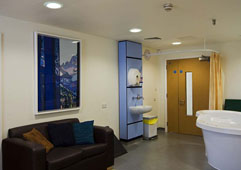 Here is my birth story recorded for posterity, and future emotional blackmail (do you realise what I went through to bring you into this world young lady?!). It’s not meant to be a horror story, or a smug proclamation, but an honest account of the highs and lows of labour. Don’t worry, I’ll go easy on the gory bits..
Here is my birth story recorded for posterity, and future emotional blackmail (do you realise what I went through to bring you into this world young lady?!). It’s not meant to be a horror story, or a smug proclamation, but an honest account of the highs and lows of labour. Don’t worry, I’ll go easy on the gory bits..
Sunday 8th Jan
At 4:30 AM I had my very first contraction proper. For a few days before this I had been gearing up with plenty of practice contractions (aka Braxton Hicks), but this was clearly different – it had the Ouch-Factor. I continued to get these on an irregular basis through the morning, and embraced each one as a new friend that was bringing me closer to meeting my baby. It was hard to contain my excitement. With what turned out to be a highly unrealistic view of the timings involved, I declared “We’re going to meet our baby today” as soon as my Husband awoke.
At lunchtime I had a scheduled check up with the birthing centre, and as planned we had a stretch and sweep to nudge things along. This involves giving the cervix a bit of a poke to help release more birthing hormones. As much as we were keen to let nature take its course, we were a week overdue, and wanted to avoid the risk of more intrusive interventions if we could.
My friendly contractions continued to pop along on a semi-regular basis throughout the day. All my preparations and positive approach to birth were paying off and I was coping well.
I found it strangely relaxing to sit and watch my Husband playing Mario Galaxy, and was particularly entertained by how stressed he was getting on the difficult levels. This lead to a bit of role reversal..
Me: Breathe deeply and stay calm. I know you can do this, just be strong and believe in yourself.
Husband: Arrrgh! [swearing] [sound of Mario dying]
Towards the evening my newfound chums were getting more frequent and uncomfortable. I hooked myself up to my TENs machine which was really helpful. A TENs machine helps to release your body’s natural painkillers by sending electric pulses via some pads stuck to your back. I tried to go to bed and sleep, but at this point the contractions were coming thick and fast. My husband became obsessed with timing them. After a few hours of contractions coming in every 4 – 5 minutes, we felt it was time to head to the birthing centre.
Monday 9th Jan
We arrived at the birthing centre in the early hours of Monday morning – hopeful that this was it, our baby was coming. After letting us settle in for a bit, the midwife gave us a check and declared me to be 1 and a half CM dilated. This was miles off the 4 or 5 CM we needed to be classed as in established labour. Disappointed and tired, we trotted back home with our tails between our legs.
Top tip: If we were to do it all again, we would not have got so over excited on the first evening. Instead of spending hours scribbling lists of contraction times and rushing to the birth centre, we should have concentrated on getting rest, and waiting till contractions were 3 to 4 minutes apart before going anywhere.
When home I had a lengthy hot bath and spent the day relaxing in front of classic comedy shows (Fawlty Towers, Spaced, Alan Partridge – great pre-labour viewing).
Top tip: Shouting Alan Partridge catch phrases (Cashback! Kiss my face..) is a great way to celebrate the ending of each contraction. High fives are also good.
By the early afternoon the contractions had slowed to about every half an hour. We made a few half hearted attempts to encourage them back (reflexology, yoga poses) before realising that it would probably be better to accept the situation and try and get some rest.
As I found it to be more painful when lying down, I managed to doze between the contractions by sitting up in bed using a complicated arrangement of pillows, soothed by the relaxation playlist I had put together on my iPod.
Tuesday 10th Jan
We were a little despondant to find that on Tuesday morning, my contractions were still coming only every half an hour or so. Luckily we had an appointment booked in at lunchtime for a further stretch and sweep – we were keeping up our spirits in the hope that this would get things moving again.
At the check in we were declared to be 2 – 3 CM dilated – at least all of yesterdays efforts were not in vain! We were also informed that the baby, though head down, was not quite in an ideal position. Her back was almost aligned with mine (her back to my front is best) and it seemed like her curious nature was prompting her to want to enter the world face first. The midwife reassured me that these factors were adding to the discomfort of my contractions, though perhaps the knowledge of this reduced my bravery in the face of them, giving me an excuse for self-pity to start creeping in.
As on Sunday, the stretch and sweep did the trick. By the evening we were back in the realm of regular contractions. However, after 3 days of pre-labour, I was losing my ability to cope with the pain. Even though we knew that it might still be too early, being on the brink of night number 4 with no proper sleep, desperation was kicking in and we needed guidance and support.
So back we went to the birthing centre. We had come on a little since the afternoon’s check and were 3CM dilated. At this point, my spirit needed a boost. Here’s what I wanted to hear from the midwife..
“Considering the length of your pre-labour and the position of the baby, you must be in extreme discomfort. In all my years of midwifery, I have never seen such bravery in the face of pain. You must be a super-person from the planet amazing, and I bow down to your inner strength”
Here’s what I needed to hear and actually did hear..
“Your contractions aren’t even that strong. You need to calm down and breathe normally”
A note on my breathing. For most of my pre-labour I had been utilising the yoga technique of using vocal sounds to help me stay calm and focus on my breathing. I would breathe in through my nose, and then maximise the length of my out-breath using a gentle “aaaaaaa” sound. For the most part this had worked really well. Until now, when I realised that the “aaaaaa” had turned into more of an “AAAARRRRRGHHHH!”, and instead of keeping me calm it was just helping me to lose myself in the sensations of pain.
Top tip: Staying relaxed through the contractions really is hard work, especially if you are exhausted. You have to work pro actively to make it happen, and it does help to ease the discomfort. Once my Husband saw the benefits, he took on the role of an American war movie drill sergeant, and was all up in my face forcefully demanding that I keep my muscles and breathing soft. This may not sound relaxing in the normal sense, but is really what I needed to stay focussed and strong. I would have benefited from being coached in this way from earlier in the process.
Thankfully the Midwife recognised my need to get some rest, and instead of sending us home she let us stay and gave me some drugs. Pethidine to the rescue! In the ideal world of my Birth Plan, I did not want to take pethidine, being an opiate that crosses the placenta to reach the baby. However, when taken enough in advance of labour so that the effects have fully worn off by the time the baby is born, the benefits can certainly outweigh any risks. My story is a textbook case of how pethidine should be used.
Pethidine does not take away the pain, it just puts you into an altered state of consciousness which allows you to accept the pain without an emotional response to it. You feel a bit drunk and very floaty. It meant that I could sleep or at least rest properly between the contractions.
Top tip: Always keep an open mind and never be a slave to your birth plan.
Wednesday 12th Jan
In the early hours of the morning the pethidine was wearing off and we had another check. I was 4 CM dilated and officially in established labour – hurray! This meant we weren’t going anywhere and I could finally make use of the birthing pool. Slipping into the warm water was just blissful, and gas & air replaced my TENs machine as the tool to help me get through the contractions. The water and gas & air combo worked wonderfully, especially with my relaxation playlist in the background. I kept up my altered state of consciousness, losing awareness of time or anything that was happening around me. Enjoying the head rush after each contraction and falling asleep between them. I would find myself waking up trying to explain something I was dreaming about to my suitably confused Husband.
After a few hours, the time came to push. I was surprised to find the pushing phase is much less painful than the preceding contractions. Suddenly you are in the driving seat. The contractions aren’t just inflicted on you, they are a powerful tool to help you bring your baby into the world.
At the beginning of the process, there was a little confusion about what pushing actually involved. I had read a Hypnobirthing book and faithfully practised my birth breathing – where you maintain oxygen flow and push on an out breath.
Midwife: You can start pushing now
Me: I am pushing
Midwife: You’re not
Me: I am, I’m birth breathing
Midwife: Err, no. Maybe if it was your second baby you could breathe it out, but you need to push. Hold your breath and pretend you’re doing a poo
Me: OK
After an hour or so of pushing in the birthing pool with insufficient progress, our dream of a water birth was abandoned, and we moved to dry land. Surrounded by midwives and Husband cheering me on like an Olympic athlete, I pushed with every ounce of what little energy I had left. Various positions later, we were still making slow progress. Normally midwives will only allow two hours of pushing, and we were knocking on two and a half. Again, intervention became necessary, and I had an episiotomy. In the spirit of sparing you the gory details, I won’t explain what this is, but feel free to look it up. The effects were instant, and a Baby’s head appeared.
During the pushing phase I had retracted so far into myself, and was so focussed on the task at hand, that when my Baby emerged and was handed to me, I recoiled in shock. I had actually forgotten that there would be a child at the end of all this!
It was thus that my beautiful Daughter made her entrance to this world – calm, alert and healthy. Ready to be wrapped up in our arms and in our love.











